CalDB 4.12.0 Public Release Notes
Public Release Date: 31 JAN 2025
SDP Installation Date: 2025-01-31T17:15:53 (UTC)
I. INTRODUCTION
CalDB 4.12.0 is an upgrade to the Chandra CalDB, which includes the following items:
For the CIAO 4.17 / CalDB 4.12.0 release notes see How CalDB 4.12.0 Affects Your Analysis.
II. SUMMARY OF CHANGES
A. ACIS P2_RESP vN0009 File Set
| Location: | $CALDB/data/chandra/acis/p2_resp/ |
| Filenames: | acisD2000-01-29p2_respN0009_105-107.fits acisD2000-01-29p2_respN0009_107-109.fits acisD2000-01-29p2_respN0009_109-111.fits acisD2000-01-29p2_respN0009_111-113.fits acisD2000-01-29p2_respN0009_113-115.fits acisD2000-01-29p2_respN0009_115-117.fits acisD2000-01-29p2_respN0009_117-119.fits acisD2000-01-29p2_respN0009_119-120.fits |
The following P2_RESP files have been retired from the distribution and the index:
- acisD2000-01-29p2_respN0008.fits
- acisD2000-01-29p2_respN0007.fits
- aicD20000-01-29p2_respN0006.fits
For some time now, it has been known that the ACIS RMF has been affected by CTI affects, particularly at temperatures above -112.0 C for ACIS-I. After considerable calibration efforts by the ACIS Calibration Team, a new set of P2_RESP files (CalDB input files for CIAO tool mkacisrmf which are effective over -120C to -105C have been prepared, tested extensively, and released in CalDB 4.12.0.
There are eight new files in all, each effective over a 2-degree (K) ACIS focal-plane temperature (FP_TEMP) range. The relevant FP_TEMP range is given in the respective filenames, with the lowest FP_TEMP file (acisD2000-01-29p2_respN0009_119-120.fits) being identical to the previous version N0008 file inputs. In other words for data within one degree of the nominal -120C operational temperature, the derived RMFs remain unchanged.
More detail is given in the Technical Details section below, including illustrations of the effects of warmer operating temperatures.
See the why page Creating ACIS RMFs with mkacisrmf for an explanation of the procedure for generating local ACIS RMFs.
PIPELINES/TOOLS AFFECTED:
The CIAO tool mkacisrmf requires one of the two SC_MATRIX extensions as its infile parameter input. The CIAO script specextract uses mkacisrmf to generate ACIS RMFs for specific source regions identified by the user for imaging spectroscopy.
THREADS AFFECTED:
- Extract Spectrum and Response Files for a Pointlike Source
- Extract Spectrum and Response Files for an Extended Source
- Extract Spectrum and Response Files for Multiple Sources
B. HRC-S QEU vN0021
| Location: | $CALDB/data/chandra/hrc/qeu/ |
| Filenames: | hrcsD1999-07-22qeuN0021.fits hrcsD2000-01-01qeuN0021.fits hrcsD2001-01-01qeuN0021.fits hrcsD2002-01-01qeuN0021.fits hrcsD2003-01-01qeuN0021.fits hrcsD2004-01-01qeuN0021.fits hrcsD2005-01-01qeuN0021.fits hrcsD2006-01-01qeuN0021.fits hrcsD2007-01-01qeuN0021.fits hrcsD2008-01-01qeuN0021.fits hrcsD2009-01-01qeuN0021.fits hrcsD2009-09-15qeuN0021.fits hrcsD2010-09-14qeuN0021.fits hrcsD2012-03-29qeuN0021.fits hrcsD2012-10-05qeuN0021.fits hrcsD2013-09-21qeuN0021.fits hrcsD2015-02-17qeuN0021.fits hrcsD2016-02-22qeuN0021.fits hrcsD2016-07-29qeuN0021.fits hrcsD2017-01-25qeuN0021.fits hrcsD2017-06-06qeuN0021.fits hrcsD2017-09-27qeuN0021.fits hrcsD2018-01-20qeuN0021.fits hrcsD2018-05-27qeuN0021.fits hrcsD2018-09-27qeuN0021.fits hrcsD2019-02-25qeuN0021.fits hrcsD2019-08-23qeuN0021.fits hrcsD2020-01-18qeuN0021.fits hrcsD2020-07-23qeuN0021.fits hrcsD2021-05-14qeuN0021.fits hrcsD2021-09-03qeuN0021.fits hrcsD2022-09-09qeuN0021.fits hrcsD2023-09-08qeuN0021.fits hrcsD2024-03-04qeuN0021.fits hrcsD2024-07-12qeuN0021.fits hrcsD2024-09-20qeuN0021.fits hrcsD2024-11-07qeuN0021.fits |
The HRC Calibration Team has released a new HRC-S QEU file set, version N0021 which includes 37 new files. This includes one additional file from the N0020 set, effective on 2024-11-07, which is based on the December 2024 HZ43 observations. The decline in the net QE relative to the June HV increase test is minor, around 1%.
As usual, this set completely replaces the N0020 file set, which is now retired from the distribution and the index.
See the HRC-S QE/QEU why page for information on the current HRC-S QE and QE Uniformity. See the technical details section below for illustrations and details of the derivation of these new QE Uniformity corrections.
SDP Pipeline / CIAO SCRIPTS/TOOLS AFFECTED:
The SDP grating L2 pipeline tool "tg_mkresponse.py" is used to generate single-source GARFs and GRMFs for HRC-S/LETG observations, to be ingested onto the archive. This procedure uses the HRC-S QEU library as loaded from the ARDLIB.
See the CIAO script fluximage, which uses mkinstmap.
THREADS AFFECTED:
For exposure-corrected imaging analysis with HRC-S, see the thread:
For grating spectroscopy with the LETG/HRC-S, see the thread:
III. TECHNICAL DETAILS
A. ACIS P2_RESP vN0009 File Set
The figure below (Fig. 1) illustrates the variation in the response of a simulated blackbody spectrum with a 1 keV Gaussian line when using the warm RMFs (-112C, -106C) versus the cold (-120C) RMF. The P2_RESP files used to generate the three RMFs are:
- acisD2000-01-29p2_respN0009_105-107.fits (-106C, green)
- acisD2000-01-29p2_respN0009_111-113.fits (-112C, orange)
- acisD2000-01-29p2_respN0009_119-120.fits (-120C, blue)
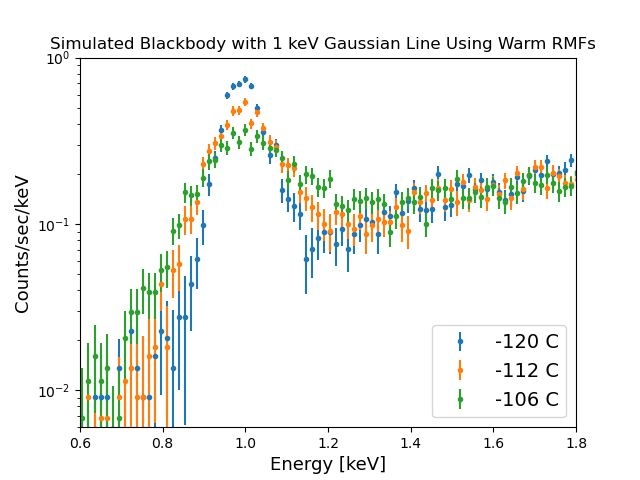
Fig. 1: Response from a simulated blackbody spectrum with a 1 keV Gaussian line using three of the new P2_RESP files to
generate RMFs for different FP_TEMP values.
Clearly as the FP_TEMP increases, the line distribution is broadened and the peak decreases, which is the anticipated effect.
B. HRC-S QEU vN0021
The HRC-S QEU N0020 file set adds one additional QEU file, effective 2024-11-07T00:00:00, and based on two HZ43 observations from December 2024 (including OBS_ID 30696). The new file upstages the last file from the previous N0020 set, effective 2024-09-20T12:10 UTC based on the most recent HZ43 observations (28427, from June 2024, and 29452, from August 2024.) The wavelength-independent drop in the net QE from June 2024 about -1%.
The plots in Fig. 2 below give wevelength-dependent corrections applied to each file, with the black traces for S1, the red for S3.
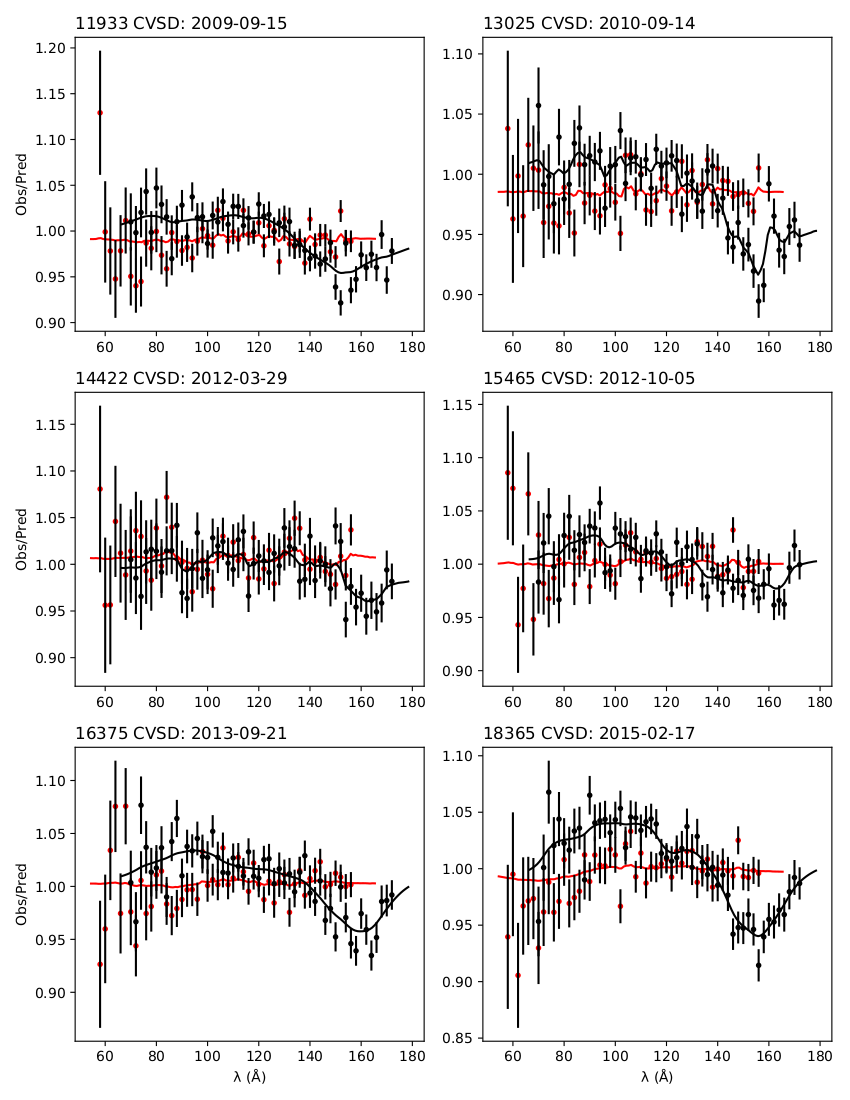 |
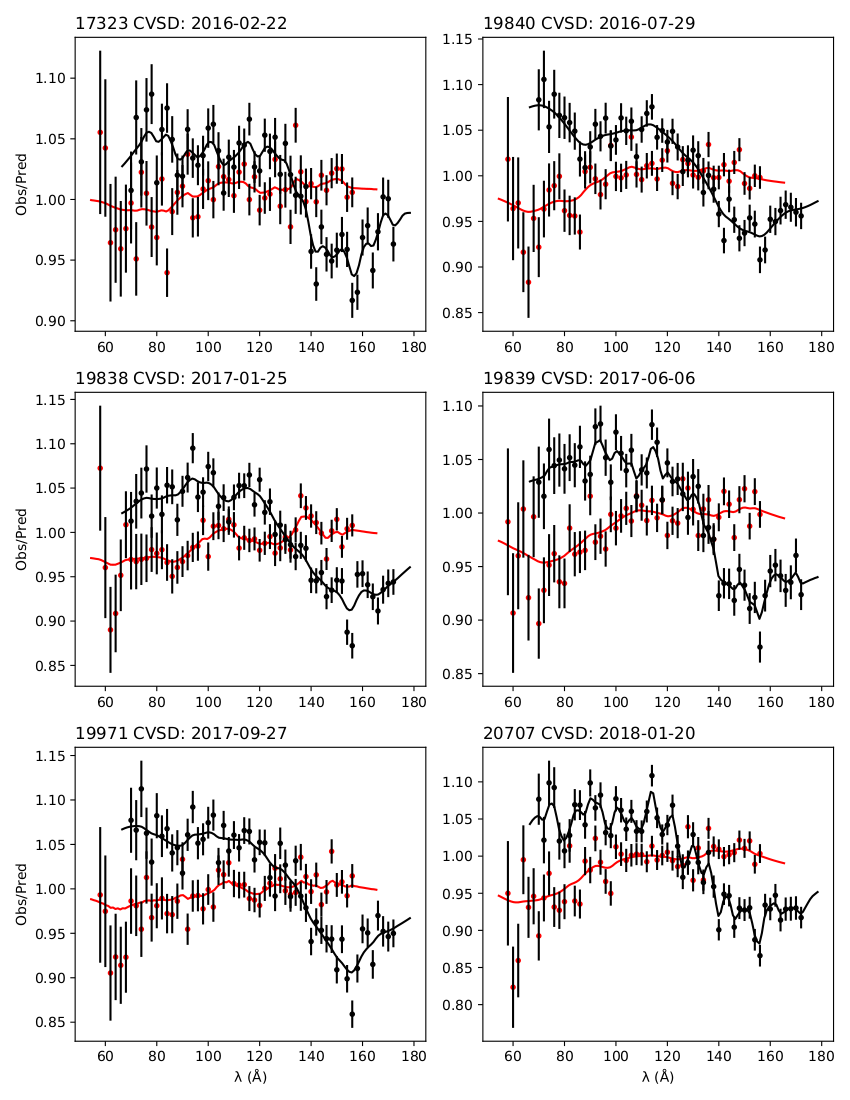 |
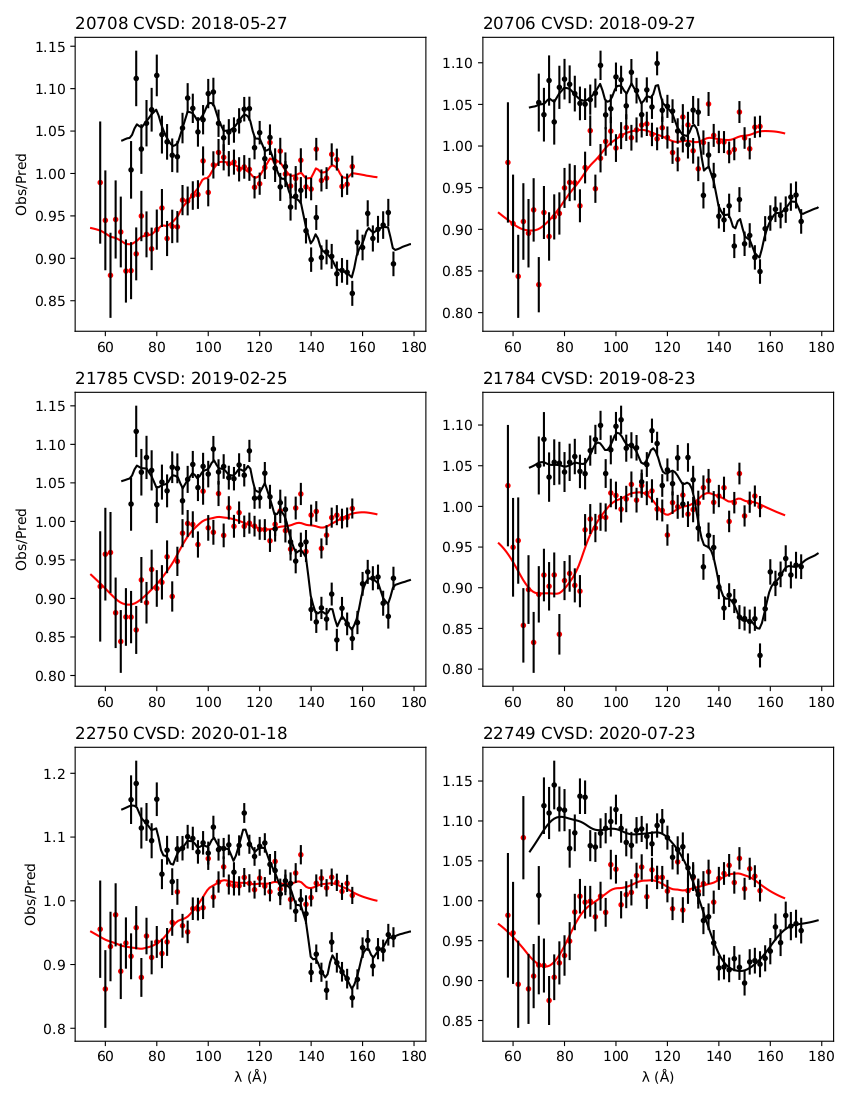 |
 |
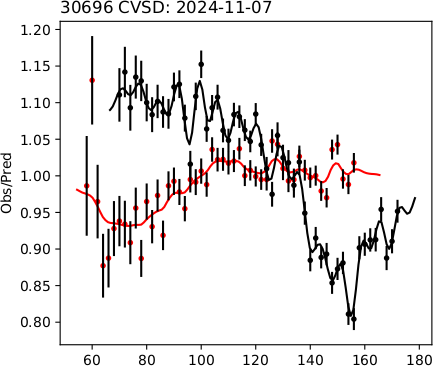 |